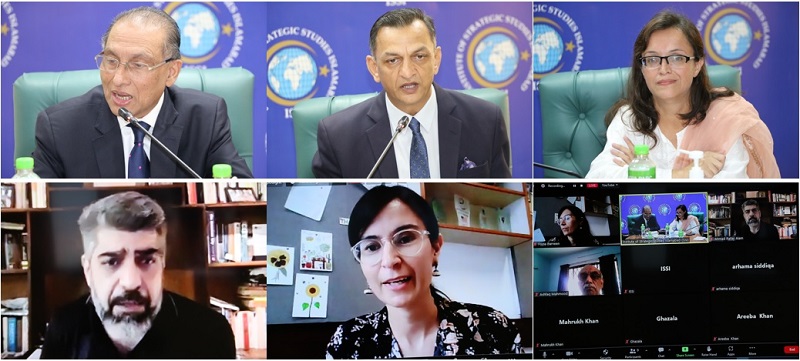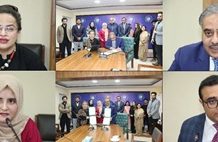Press Release
Panel Discussion: “Preventing Floods in Pakistan: Role of Planning”
September 1, 2022

The Centre for Strategic Perspectives (CSP) at the Institute of Strategic Studies Islamabad (ISSI) organised a Panel Discussion titled, “Preventing Floods in Pakistan: Role of Planning” on September 1, 2022. Dr. Hassan Abbas, Founder ZIZAK, was the Keynote Speaker for the event and other discussants included: Mr. Ahmad Rafay Alam, Environmental Lawyer; and Dr. Fozia Parveen, Assistant Professor, Agha Khan University.
In her introductory remarks Dr Neelum Nigar, Director, CSP, welcomed the guests and said that Pakistan is suffering from major flood catastrophe and discussion on this issue is very important to understand the complexities behind it.
While in his welcome remarks Ambassador Aizaz Ahmad Chaudhry, Director General, ISSI, said that Pakistan is facing unprecedented floods and whether it is a recuring phenomenon or an exceptional situation still needs to be determined. Pakistan needs to manage disasters better and create awareness to prevent and minimise the impacts on the masses.
In his keynote address, Dr. Hassan Abbas said that floods are based on hydrology and need to be studied with science. Climate Change is very important to understand as its prediction at the local scale is inaccurate. On the planetary scale, the rise in temperature leads to rise in moisture which in turn leads to increase in precipitation. Rearrangements of our climate models will take time before they can make accurate predictions. Right now, Pakistan is entering into an erratic era with floods and droughts interspersed with each other, so predictions about rainfall, droughts and Climate Change are very uncertain. Pakistan needs to understand its natural, ecological system and manage accordingly.
While commenting on the recent floods, Dr Abbas said that canal banks and road and rail infrastructures have disrupted the sheet flow of water causing the flood waters to stand especially in Sindh. The stagnant water has compounded the hardships for the people. From 2010 floods we have not learned much and are back in the same situation. He further stated that advisory circles in Pakistan are opinion driven rather than science driven, which needs to be changed. Pakistan must fix its flawed development models because its impacts are socio- economically unsustainable and it needs to be addressed in a systematic manner.
In his remarks, Mr. Rafay Alam said that Climate Change caused by greenhouse gases led to increase in temperatures especially in the period after the Industrial Revolution. Climate Change does not respect national borders, but today’s security systems are based on national states which is not capable to deal with environmental problems. UNFCC puts focus on development countries to help developing countries to deal with climate change. Going forward, Mr Alam stressed that Pakistan is going to face erratic weather comprised of heatwaves, flash floods and droughts due to already existing greenhouses gases in the atmosphere. He suggested that with better coordination mechanism between centre and provinces is need of the hour, which unfortunately even having 18th amendments in place is missing. Moreover, the developed world needs to take responsibility and help the Global South deal with the crisis.
Dr. Fouzia Parveen in her remarks said that lack of policy implementation and lack of government responsibility is causing problems in climate induced disaster response in Pakistan. The blame game must stop, and responsibilities need to be shared by all stakeholders. Learnings from the past are not being implemented in the present situation. Preparedness to disasters needs to be worked on the government needs to increase its capacity to deal with climate caused disasters. It is time for less talk and more action.
The discussion ended with an interactive session with the speakers.











